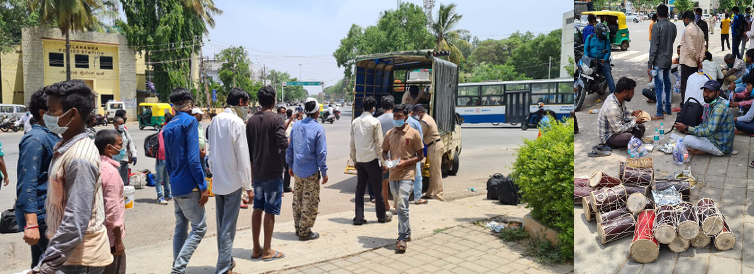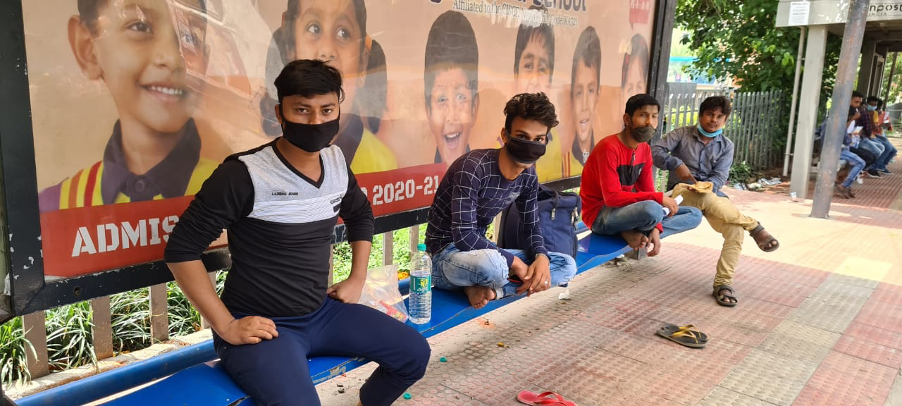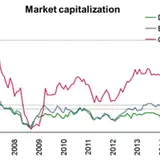Discredited by a Pandemic
Saad is a plumber from a state called Bihar in India. He works in Bengaluru, a city in the southern part of India, almost 1000 miles from his hometown. He sits at a bus stop with a couple of his friends, maybe native-mates. The bus stop is close to a police station in the suburbs of Bengaluru, where wageworkers who belong to various states from different parts of India, gather to get themselves registered, before they are allowed to travel back home. It is early May, nearly 50 days after the first Covid19 lockdown that was imposed on March 24th by the government – a period when India witnesses its largest migration post independence as migrant workers try to get back to their villages and towns in the aftermath of the lockdown. The place is relatively crowded - people queuing up to a registration desk manned by policemen, a lot of workers just sitting on the footpath with their bags and belongings, some with their left-over wares that are the only version of money they own and people from some local NGOs (Non-Government Organizations) who are distributing food packets. A few buses lie in wait, partially filled up.

Saad sits at the bus stop and seems to have an air of nonchalance about what is going on. He is gaunt, wearing a slim fit blue checked t-shirt and shredded denim-blue carrot fit jeans. He smiles on and off, maybe even smirks as he is speaking. Clearly it is his age, as he must be all of 22. As he sits with his belongings - a blue bag, I wonder why he does not seem to be in a hurry to get back home, a town in Bihar – a state in the eastern part of India, from where he and his native-mates hail. He does not appear to be hankering to stand in the queue or get ahead of others. He does not even seem to be looking wistfully at the buses that are stationed right in front of him, that take the registered workers to the city’s central railway station from where they would eventually get back home.


As he begins to speak, in a tone, that is a strange mix of cynicism and nonchalance, I begin to make sense of the subterranean conflict that underlies his behavior of landing at the registration center and yet not leaving the city. He is waiting for something, even as he keeps a daily tab of the chances, he has to make it back home, sometime over the next few days.
He is waiting for his money that is due to him. Like I mentioned Saad is a plumber, a weekly wage worker who works for a small contractor, who in turn might be working for some larger contractor or a project management firm, who in turn might be working for some facility management company or some real estate company. Saad is a plumber at the bottom of this economic totem pole. Or the power totem pole, should I say.
Saad is actually waiting for a pending amount of Rs.40000 or 530 USD (that’s a crazy sum of money at the bottom of the economic totem pole) that is owed to him by his contractor. Given the patriarchal and very often oppressive relationships that exist between some contractors and their labor force, some part of the wage is paid weekly for expenses, some part is retained as pay out for emergencies that may befall the wage workers, some part of it is retained as forced savings to avoid it being used for dysfunctional habits like drinking or gambling, some part is ambiguously mapped to the accommodation or some such benefits provided by the contractor and therefore not paid in cash. It is a maze of mathematical and transactional ambiguity that is further compounded by Saad’s own lack of clarity about how the money comes, how much of it comes and how it goes. Saad feels he is currently owed Rs.40000 (530 USD). His contractor’s whereabouts are not clear either, maybe he left for his native town or village. Maybe he is lurking in the shadows of the lockdown waiting for his money as well from someone else. No one knows.
This is Saad’s predicament. A choice between the devil and the deep blue sea. If he were to leave Bengaluru and go back to his native place, the 530 USD due to him is lost for good, as there is no certainty about when he would come back to Bengaluru, if he would come back to Bengaluru, if the contractor would be around then and so on. If he stays behind the pressures of being holed up in a camp without money, loss of dignity are real. There is also the predicament that once he gets back home, there is no livelihood earning for himself and his entire family. He has to take his chances and stay for as long as possible. ‘Inshallah, he would get the entire 530 USD,’ he says. If not the entire sum, even half of it or a quarter of it would be worth it. It would be his sustenance for the next month or two, once he gets back home. It is a shot in the dark. But at the edges of survival it appears to be worth it.
The informal sector is massive. The Economic Survey of India estimates that the total number of internal migrants (both within states and between states) is around 140 million - almost half the population of the United States. It is a well-known fact that they work in low paying jobs, have poor representation and very low to zero bargaining power. The local wage workers may at times, if they are lucky, have the benefit of a local leader or a politician to represent their cause. The wage worker who is a migrant on the other hand is orphaned in most ways. There is no recourse to collective representation, no easy recourse to the legal machinery - the labor courts or any of that. The possibility of getting the USD 530 is truly a shot in the dark.
Terms of Credit – The pandemic that matters.
Of the many reasons, why the money does not get paid to people like Saad, one worth considering is the issue of credit. ‘Terms of credit’ is an instrument of profit that corporations exercise with their suppliers/ vendors. The ability of the procurement team to squeeze out the maximum credit from its vendors is very often seen through the lens of financial prudence - a symbol of healthy financial practice, one that leads to success. It is here that the bargaining power makes its way in - an operating system that lies beneath the surface. At risk to the vendor are potential loss of business, of being de-rostered from the vendor list, of emotional paybacks that could include goods returns, greater percentage of rejects, repetition of work or services from among others, if he or she refuses to agree to a longer credit period. The bargaining power has an innate intelligence to figure this out and apply the squeeze. The capitulation is predictable, as the vendor has a business to run as well. At best, the vendors may find out some devious ways to protect their profits - it could be by evading taxes, hiding their income, bribing the buyers, indenting poor quality materials sourced at lower costs. The list is endless but included in that list is also the passing on the burden of extended credit periods down the totem pole to people like Saad, resulting in delayed payments and even default in payments. Like wealth accumulates at the top of the food chain, so does bargaining power. Saad is a voiceless victim of this structure.
Barring the rare exceptions, the average ‘Procurement Joe or Jane’ stays disconnected from his or her decisions. The firms, again with a few exceptions, also pass on the buck of responsibility to the other entities in the ecosystem – a behaviour that Scott Peck famously referred to as fragmentation of consciousness. To quote - “Whenever the roles of individuals within a group become specialized, it becomes both possible and easy for the individual to pass the moral buck to some other part of the group. In this way, not only does the individual forsake his conscience but the conscience of the group as a whole can become so fragmented and diluted as to be non-existent.”
Companies have values - integrity, social responsibility, fairness, respect and such other ‘parts of speech’. Governments have the labor departments, the payment of wages act, the labour courts and such other mechanisms. Terms of credit are willingly or unwillingly instruments of oppression. Saad is a victim and a society cannot afford too many victims. But this pandemic has revealed a little more emphatically another pandemic that always lay hidden. Saad is more worried about one and not the other. Little wonder he smirks in disdain, as I ask him about his feelings about the virus, the pandemic we all seem to be fussing about.



